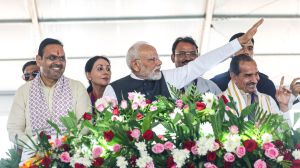Arnie swaggers in
Arnold Schwarzenegger could perhaps be forgiven for celebrating his election as California’s next governor the only way he knows how: w...

Arnold Schwarzenegger could perhaps be forgiven for celebrating his election as California’s next governor the only way he knows how: with an action shot. Promising to rescind his predecessor’s extremely unpopular car tax on his very first day in office, he smashed a car to signal his unwavering intent. It was a fitting finale to a most absurd political campaign. It has certainly been entertaining, but it was also chilling. California has always intimated the rest the world about transformative changes on the anvil — with, for instance, entertainment trends constantly redefined in Hollywood, IT revolutions spun in Silicon Valley, social contracts redrawn on the fringes of its university campuses. Now it offers a preview of the perils of direct democracy. It’s not Californians’ faith in Gubernator to rescue them from their fiscal mess that’s at issue here, it is the manner in which he has been installed in office.
California’s recall initiative comes amidst continuing advocacy around the world that the voter be involved at every turn in administration and governance. In principle, this is a laudatory objective. Translating it into reality would be a worthy project. But for inspiration, don’t look to California — survey it instead for lessons in how not to devolve power. Take the recall vote. In a first-past-the-post election, it demands that the incumbent governor register a 50 per cent endorsement from the electorate to continue in power. Indeed, if it were not for Schwarzenegger’s popularity, a candidate with a lower approval percentage than the incumbent, Gray Davis, could have found himself swept to power. In any case, having been elected, the Gubernator will find his hands rather tied. California’s embracing of direct democracy includes the ballot initiative. Propositions are posed and Californians can vote on how they should be taxed and governed. This has had some rather illiberal consequences. In 1996, they cleared a proposition to outlaw affirmative action. And over the years they have voted to cap how much they can be taxed and to what purpose this revenue can be allotted. The result: a state with the world’s sixth largest economy in economic crisis, a state known for its hospitality to immigrants riven by ethnic divisions.
Hence, California must underline the need for checks and balances in democratic procedures. As Fareed Zakaria argues in his recent book, The Future of Freedom, it must point to the difference between unfettered and enlightened democracy. And, of course, it is bound to show how a movie star, especially one with as successful and as controversial a past as Schwarzenegger, always spices up an election.




- 01
- 02
- 03
- 04
- 05


























